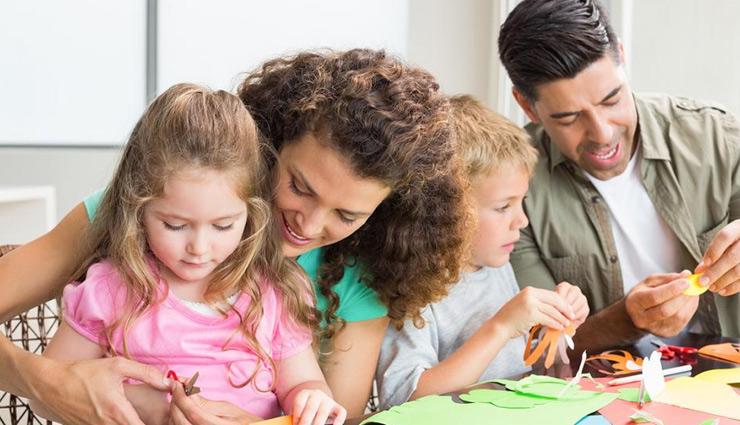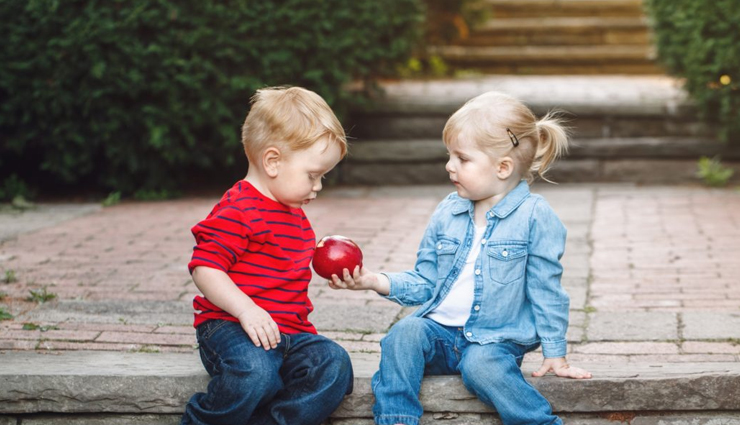- Home›
- Mates & Me›
- 7 Good Social Skills You Must Teach To Your Kids
7 Good Social Skills You Must Teach To Your Kids
By: Kratika Maheshwari Fri, 04 Sept 2020 1:57:12

Good social skills allow kids to enjoy better peer relationships. But the benefits of robust social skills reach far beyond social acceptance. Children with better social skills are likely to reap immediate benefits. For example, one study found that good social skills may reduce stress in children who are in daycare settings.
Social skills are a set of skills that need ongoing refinement as your kids get older. They aren’t something your child either has or doesn’t have. Look for teachable moments where you can help your kids do better. In fact, some social skills are quite complicated—like understanding it’s important to be assertive when a friend is being bullied, or understanding staying silent when you don’t agree with a call from the umpire.
Meanwhile, kids who have strong social skills and can get along well with peers are likely to make friends more easily. In fact, a study published in the International Encyclopedia of the Social & Behavioral Sciences, indicates that childhood friendships are good for kids’ mental health.
Good social skills also can help kids have a brighter future. According to a study published in the American Journal of Public Health, a child’s social and emotional skills in kindergarten might be the biggest predictor of success in adulthood.
?Researchers from Penn State and Duke University found that children who were better at sharing, listening, cooperating, and following the rules at age five were more likely to go to college. They also were more likely to be employed full-time by age 25.
Children who lacked social and emotional skills were more likely to have substance abuse issues, relationship issues, and legal trouble. They were also more likely to depend on public assistance.

* Sharing
A willingness to share a snack or share a toy can go a long way to helping kids make and keep friends. According to a study published in Psychological Science, children as young as age two may show a desire to share with others—but usually only when their resources are abundant.5?
However, children between the ages of three and six are often selfish when it comes to sharing resources that come at a cost. For example, children with only one cookie might be reluctant to share half with a friend because it means they’ll have less to enjoy. On the other hand, those same children might readily share a toy that they're no longer interested in playing with.
While you may not want to force your child to share certain toys or with certain children, you can regularly point out sharing when you see it. Praise your child for sharing and indicate how it makes others feel. Say something like, “You chose to share your snack with your sister. I bet she feels happy about that. That’s a nice thing to do.”
* Co-operating
Cooperating means working together to achieve a common goal. Kids who cooperate are respectful when others make requests. They also contribute, participate, and help out.
Good cooperation skills are essential for successfully getting along within a community. Your child will need to cooperate with classmates on the playground as well as in the classroom. Cooperation is important as an adult, too. Most work environments thrive on employees’ ability to work together as a team. Cooperation is key in romantic relationships as well.
Talk about the importance of teamwork and how jobs are better when everyone pitches in. Create opportunities for the whole family to work together. Whether you assign everyone a specific job when you’re making a meal or you assign specific chores that are integral to the family, emphasize the importance of cooperation.

* Listening
Listening isn’t just about staying quiet—it means really absorbing what someone else is saying. Listening also is a critical component of healthy communication. After all, much of the learning in school depends on a child’s ability to listen to what the teacher is saying. Absorbing the material, taking notes, and thinking about what is being said becomes even more important as your child advances academically.
It's essential that your child grows up knowing how to listen to the boss, a romantic partner, and friends. This skill may be an even more difficult skill to master in the age of digital devices because so many people tend to stare at their smartphones when they’re engaged in conversation.
When reading a book to your children, periodically stop and ask them to tell you about what you’re reading. Pause and say, “Tell me what you remember about the story so far.” Help them fill in any gaps they're missing and encourage them to keep listening as you continue. Additionally, don’t allow them to interrupt others when they’re talking.
* Following Directions
Kids who struggle to follow directions are likely to experience a variety of consequences. From having to redo their homework assignments to getting in trouble for misbehavior, not following directions can be a big problem.
Whether you instruct your children to clean their rooms or you’re telling them how to improve their soccer skills, it’s important for kids to be able to take direction—and follow instructions.
Praise your child for following directions by saying things like, “Thank you for turning off the TV the first time I told you to.” If your children struggle to follow directions, give them opportunities to practice following simple commands. Say things like, “Please pass that book to me,” and then provide immediate praise for following directions.

* Making Eye Contact
Good eye contact is an important
part of communication. Some kids struggle to look at the person they’re
speaking to. Whether your child is shy and prefers to stare at the
floor or simply won’t look up when engrossed in another activity,
emphasize the importance of good eye contact.
If your child
struggles with eye contact, offer quick reminders after the fact. In a
gentle voice, ask, “Where should your eyes go when someone is talking to
you?” You don't want to cause a shy child additional anxiety. And,
provide praise when your child remembers to look at people when they’re
talking.
You might even show your children how it feels to hold a
conversation with someone who isn’t making eye contact. Ask them to
share a story while you stare at the ground, close your eyes, or look
everywhere except for at them. Then, invite them to tell another story
and make appropriate eye contact while they're talking. Afterward,
discuss how it felt in each scenario.
* Respecting Personal Space
Some kids are close talkers. Others crawl into the laps of acquaintances without any idea that the other individual feels uncomfortable. It’s important to teach kids how to respect other people’s personal space.
Create household rules that encourage kids to respect other people’s personal space. “Knock on closed doors,” and “Keep your hands to yourself,” are just a few examples.
Teach your children to stand about an arm's length away from people when they're talking. When they're standing in line, talk about how close to be to the person in front of them and talk about keeping their hands to themself. You might role-play various scenarios to help them practice describing appropriate personal space.
* Using Manners
Saying please and thank you and using good table manners can go a long way toward helping your child gain attention for the right reasons. Teachers, other parents, and other kids will respect a well-mannered child.
Of course, teaching manners can feel like an uphill battle sometimes. From burping loudly at the table to acting ungratefully, all kids will let their manners go out the window sometimes.
Be a good role model with your manners. That means saying, “No, thank you,” and “Yes, please,” to your child on a regular basis. And make sure to use your manners when you’re interacting with other people. Offer reminders when your children forget to use manners and praise them when you catch them being polite.





